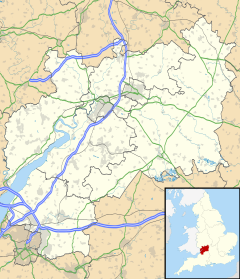Bagpath
This article needs additional citations for verification. (August 2008) |
| Bagpath | |
|---|---|
 Newington Bagpath church | |
Location within Gloucestershire | |
| Population | 100 [citation needed] |
| OS grid reference | ST8094 |
| Civil parish | |
| District | |
| Shire county | |
| Region | |
| Country | England |
| Sovereign state | United Kingdom |
| Post town | Tetbury |
| Dialling code | (01453) |
| Police | Gloucestershire |
| Fire | Gloucestershire |
| Ambulance | South Western |
| UK Parliament | |
Bagpath is a hamlet in Gloucestershire, England, in the Ozleworth valley near the village of Kingscote and forming part of Kingscote civil parish. The hamlet consists of two separate settlements of Bagpath and Newington Bagpath, although residents of both frequently refer to both as Bagpath. A variation in spelling: Neunton & Pagpath appears in 1418, when William Stoke was the parson of the church.[1]
The hamlet falls under the authority of Cotswold District Council and is represented by the Conservative MP, Geoffrey Clifton-Brown.
The hamlet is sparsely populated with a population of about 100 people, with a small number of farms. The vast majority of the area is pasture or woodland.
Note; not to be confused with the area of the same name, at nearby Rodborough, above the Golden Valley at Thrupp.
History
Although the population is now only about 100, census records from the 1900s show it was once about 1,000. The parish once had its own church and school, but the former school house is now a private home and, although in private ownership, the church is now abandoned. The parish of St Bartholomew was united with the neighbouring parish of Owlpen from medieval times to the late 19th century. The west tower is Norman work and the nave is medieval, with a chancel added by Samuel Sanders Teulon in 1858. The church was declared redundant in about 1973.
The parish has the site of a Motte-and-Bailey castle dating to the Norman era which is situated close to the church. The earthworks have an overall diameter of 150 ft. The mound rises to 4 ft above ground level and is surrounded by a ditch 5 ft below which fades out on the scarp side. There were indications of an entrance ramp on the north side. A pit dug into the top displayed rubble and possible vaulting. There is a rectangular building platform immediately to the north of the motte.
The Revd Alan Gardner Cornwall of Ashcroft was rector of Bagpath in the early nineteenth century and published a standard account of life in this rural area at that time.[2] His sons, Clement Francis Cornwall and Henry Pennant Cornwall emigrated to British Columbia, Canada while it was still a British colony during the gold rush. There they founded the small town of Ashcroft, British Columbia, built for travellers in search of gold, giving them a place to stay and saddle their horses. Links to Bagpath have travelled this far and photographs and maps of Bagpath and the surrounding area are held in the town's museum.
It is rumoured that King Charles II of England passed through Bagpath whilst on the run after defeat at the Battle of Worcester [citation needed]and the naming of a nearby path as Monarch's Way testifies to this.
The local community were recently united in opposition to a PPG7 planning application for a large country house in the valley which they argued would spoil the unique countryside in the area. Since this event in 2003, a number of community events have taken place, including what are intended to become annual events: the Bagpath street party and a fireworks display for local residents.
References
- ^ Plea Rolls of the Court of Common Pleas; National Archives; CP 40/629; http://aalt.law.uh.edu/H5/CP40no629/bCP40no629dorses/IMG_1714.htm; 4th entry. William Stoke, parson, was acting as an Executor, with Thomas Frome, canon of Wells, for John Forstall
- ^ Owlpen archives: Memoir of Parson Cornwall

